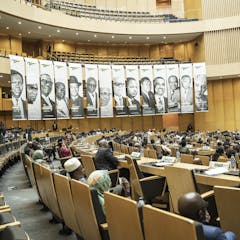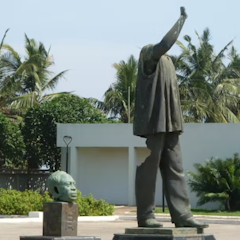
Articles on Pan-Africanism
Displaying 1 - 20 of 61 articles

Studies reveal a chequered history when it comes to the benefits of hosting the event.

African leaders have a worrying track record of prioritising narrow domestic gains over transferring supranational, binding powers to the AU.

Despite harsh laws, a growing number of African countries are representing queer life in their cinema.

The early Nelson comes across as a man consumed by insecurity and ambition, plagued by inner strife and anger.

The emergence of a pan-African voice in the fight against global warming, a global issue, could enable the African Union to regain ground on the international stage.

By the 1950s a standard version of the language emerged, today spoken by an estimated 200 million people.

Novelist Petina Gappah’s call for translators on Facebook has resulted in the publication of Chimurenga Chemhuka.

Africa has been relatively peaceful in terms of inter-state violent conflicts.

The African Union compares well to other continental unions. It accomplishes more than the Commonwealth or the Francophonie.

Finding the right balance between media freedom and limits remains one of the greatest challenges modern democracies face.

Kittrell’s legacy shows that home economics was always about more than cooking and sewing. It’s also a reminder that issues that affect families are simultaneously local and global.

Pour progresser, les États membres doivent établir des priorités contraignantes, transparentes et applicables.

Member states need to arrive at binding, transparent and enforceable priorities to see progress.

As the 20th century’s preeminent scholar-activist on race, W.E.B. Du Bois would not be surprised by modern-day attempts at whitewashing American history. He saw them in 1930s and 1940s.

South Africa’s foreign policy under Ramaphosa emphasises economic diplomacy and ‘progressive internationalism’, which promotes global equity and ending the dominance of the global north.

The recurrent bickering and fragmentation within the Nkrumahist parties raises doubt as to whether they can rise to the call by Ghanaian electorate.

John Chilembwe features on Malawi’s banknotes and is remembered in a public holiday every year. But he is little-known elsewhere.

Born 100 years ago this year, Africa’s most legendary filmmaker - and a prolific novelist -remains relevant through his beautifully crafted political works.

Afrobeats truly conquered the globe, influencing music styles, packing out stadiums and lifting awards.

Kenya’s new president needs to forge closer ties with regional heavyweights to create a balance of power that favours his country.
